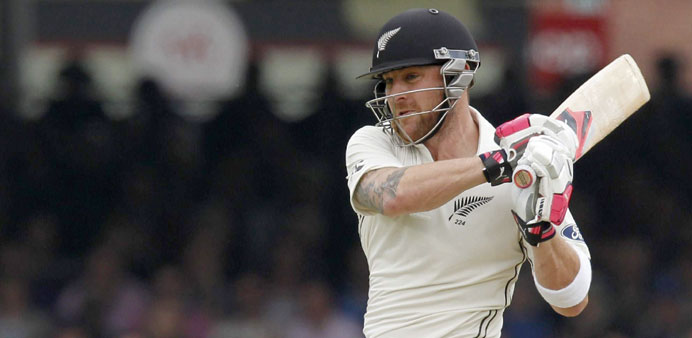By Mike Selvey at Lord’s/The Guardian
The Royal Gurkha Rifles were out in force at Lord’s. Around the ground, young soldiers from this magnificent group of fighting men, 13 of whom have been awarded the Victoria Cross, stood with collecting buckets, gathering donations towards aid for a country devastated by earthquake.
In the Bowlers’ Bar, MCC members gathered before play, tongues hanging out in anticipation, expecting the five-minute bell to be rung by Joanna Lumley, who has done so much fighting herself for the rights of these soldiers. In the event, is was not Ms Lumley at all, but Colour Sergeant Padam Gurung who gently sounded a few notes.
On the first day it had been Dickie Bird who did the honours and he rang it so enthusiastically and at such length it might have been the Trumpton fire brigade on a call-out.
Throughout the morning’s play, the clouds had gathered gloomily so that by midday the Lord’s retractable floodlights had been extended upwards and switched on.
The air became heavy and shortly before the lunch interval the rain began to wash down in fine swathes, sufficient to dampen the ambitions of the Saturday picnickers but not the marching band of the Gurkhas, nor the four accompanying soldiers who, dressed not in uniform but military fatigues, proceeded round the ground giving a choreographed demonstration of their skills and drills in handling the kukri, the curved knife synonymous with them.
As the blades flashed in the air, thoughts turned to the morning’s play, in which, while Kane Williamson – less certain than on the second day – continued his methodical way beyond his century, Brendon McCullum swashed and buckled for an hour in the manner that everyone now expects and he invariably almost feels obliged to deliver.
All the while Williamson and Ross Taylor were securing the New Zealand bridgehead, there was a storm gathering in the New Zealand dressing room, with McCullum padded up and ready to wreak havoc. Since his debut in 2004, McCullum has reinvented his game.
We know him most recognisably in his Black Caps one-day uniform, at first pinging his legside sixes, and then latterly going the other way entirely, staying legside and flatbatting over cover. He it was who scored the first hundred in the Indian Premier League and in the first match at that. One day cricket has gone some way towards transforming the manner in which he approaches his Test match batting.
But the other transformation has come with the captaincy, which began in an untidy transfer of power from Taylor, and his side being dismissed for 45 in Cape Town.
From these inauspicious beginnings McCullum has built, along with Mike Hesson, the best team, in both formats, probably that New Zealand have ever had.
If a good deal of this derives from his instinct for captaincy that makes him the outstanding onfield leader in world cricket – and the fact that he has an excellent group of responsive bowlers – then his batting from the fulcrum of the order has been at times monumental, in particular 224 against India in Auckland and 302 against the same opponents in Wellington (this over 13 hours at the crease), but latterly incendiary, so that 202 against Pakistan, in Sharjah, was from 188 balls, and 195, in Christchurch, against Sri Lanka, took an astonishing 134 balls only – the two innings containing no fewer than 22 sixes. In 70 matches before he was captain he averaged around 35: in 23 matches since the figure is almost 50.
So it was easy to understand the hum of expectation as he made his way down the pavilion steps. His side were still behind but in the ascendant, ripe for him to take the game away from England. He began in the accustomed manner, staying inside the line of his first delivery from Stuart Broad, in the middle of one of his best spells since last summer, and muscling it through extra cover to the Mound Stand boundary. It was auspicious.
For a while he rode his luck, charging at Broad, and punching just short of gully the short ball with which the bowler retaliated.
Mark Wood came on from the Pavilion End and the thought occurred that McCullum might just try to nip this one in the bud. Instead Wood found his edge, the ball flying through third slip: one had been in place for much of the day but had not long since been moved. When he then square-cut ferociously it brought up the 50 partnership of which Williamson’s contribution was five.
Ben Stokes replaced Broad, and McCullum charged once more, this time swinging to leg and connecting with the length ball , sending it over midwicket and into the Grandstand. Stokes, whose figures were not representative of his bowling or the effort he put in, just glared.
There was some justice in Wood bringing the cameo to an end, for he had bowled throughout with real pace.
McCullum swung mightily to leg once more, but somehow, from the toe of the bat, managed to send it steepling and swirling towards fine third man, where Joe Root lined it up, settled, made himself aware of the whereabouts of the boundary rope, and then calmly helped Wood to his first Test wicket.

New Zealand captain Brendan McCullum pulls during day three of the first Test against England at Lord’s. (AFP)
